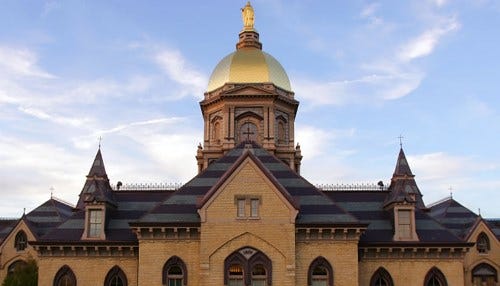Notre Dame Vows to Appeal NCAA Probation Ruling
 University of Notre Dame (photo provided)
University of Notre Dame (photo provided)
Subscriber Benefit
As a subscriber you can listen to articles at work, in the car, or while you work out. Subscribe NowThe University of Notre Dame president says the school will appeal a ruling by the NCAA Committee on Infractions that forces the football team to give up its victories in 2012 and 2013. Reverend John Jenkins says the academic misconduct in question did not take place with the university’s knowledge or direct involvement, and therefore, Notre Dame has not received an appropriate punishment.
The university says events in question involve a former student trainer who wrote papers for students-athletes. According to the university, it discovered and dealt with the dishonest actions in 2014, acting "honorably throughout." The school says the NCAA has "never before vacated the records of an institution that had no involvement in the underlying academic misconduct, and the membership has since voted ?to change the rule that brought this case within NCAA jurisdiction."
In a statement, Jenkins said:
We very much appreciate the hard work of the NCAA enforcement staff and the members of the Committee on Infractions for their review of our case, but we believe the penalty they have imposed is not justified,” Father Jenkins said.
We are disappointed in the actions of students who engaged in dishonesty, but we are gratified that the NCAA investigation confirmed the conclusions of our own internal investigation: Notre Dame acted honorably throughout. As soon as professional staff suspected academic dishonesty on the part of a student, the matter was reported promptly, investigated aggressively and thoroughly and adjudicated in accord with our Academic Code of Honor procedures and norms. In this case, everyone involved – those in Academic Services for Student-Athletes, in our football program and in our Compliance Office – and the faculty and students resolving these cases under our Honor Code did everything that we could have asked of them.
We disagree with the decision of the hearing panel to impose, at its own discretion, a vacation of records penalty. In past academic misconduct cases, the Committee on Infractions has imposed this penalty only when it has found serious institutional misconduct, such as actions with the direct involvement or knowledge of a coach or academic personnel, a failure to monitor or a lack of institutional control. The NCAA enforcement staff and the hearing panel agreed with Notre Dame that no such institutional misconduct occurred in this case. Indeed, the only reason the NCAA reviewed the matter was because the misconduct involved a former fellow student who happened to participate in the University’s student trainer program – an activity which involved no responsibility for the academic work of student-athletes.
We believe that imposition of the vacation of records penalty without serious underlying institutional misconduct will not primarily punish those responsible for the misconduct, but rather will punish coaches, student-athletes and indeed the entire institution who did nothing wrong and, with regard to this case, did everything right. We are also concerned that establishing this precedent will infringe on universities’ autonomy in deterring academic dishonesty, for it will discourage the retroactive lowering of grades even when an honor code committee deems this appropriate.
As we said at the outset of this investigation, Notre Dame would willingly accept a vacation of records penalty if it were appropriate. It is not in this case. Indeed, should this precedent stand, it could create a perverse incentive that will discourage institutions from investigating so aggressively and imposing the penalties for academic dishonesty that their honesty committees might judge appropriate.
The university says its internal review involved some 95,000 documents and concluded with four student-athletes being dismissed. It also imposed retroactive grade changes in courses affected by the cheating.
Notre Dame says it will submit its case to the NCAA Infractions Appeals Committee.
